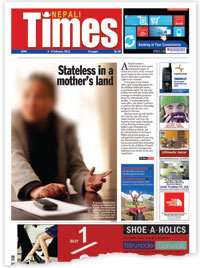 |
When the Constituent Assembly expired two weeks ago, there was disappointment but also relief at having put off a decision on ethno-federalism that was sure to leave everyone unhappy.
But federalism, governance and the proposal of a constitutional court were not the only contentious issues in the draft. There was also the pending problem of citizenship rights which has now been pushed back again.
Ten per cent of Nepal's population doesn't have citizenship, and it now looks like they will remain indefinitely stateless. Worse, without the requisite laws in place, the number of Nepalis deemed not to be Nepali will continue to grow.
Nepal's political leaders wanted a "revolutionary constitution", and they had no qualms about supporting provisions that would have effectively torn the country apart. They have also been ultra-progressive in espousing secularism, gay rights, and legislating against caste-based discrimination. But sadly, when it comes to ensuring something as fundamental and universal as equal citizenship rights for women, the attitude of our male-dominated politicians has been - to put it mildly -primitive, patriarchal and chauvinistic.
There are many levels of discrimination entrenched in Nepali society, but women of all castes and creeds face double ostracisation. Our citizenship laws have always been backward, but the draft provision in the new constitution was even more regressive than the interim constitution. Only children of a Nepali mother and a Nepali father would have been eligible to citizenship. What's wrong with that, you may ask, because it puts the father and mother on an equal footing. But it is clear that these new laws have been proposed to deter children of non-Nepali fathers from becoming Nepali citizens.
A foreigner woman marrying a Nepali man gets citizenship almost immediately, and their children get citizenship by descent. But the process is endlessly complicated for a foreigner man marrying a Nepali woman. Such a blatantly unfair clause was very nearly enshrined in our constitution had it been passed on 27 May. Our "progressive" politicians were too busy haggling over state structure and forms of governance to notice.
Far from solving the citizenship crisis, the draft constitution would have created more stateless people: children who can't prove both parents are Nepali, children whose either parent fails or refuses to get Nepali citizenship, children who cannot identify either of their parents, children whose fathers refuse to sign papers, adopted children. The pain of becoming stateless in one's own country is not limited to the denial of personal identity. Without a citizenship certificate, people cannot own property, run businesses, travel abroad, get higher education, or take jobs.
The state can't bring itself to accept matrilineal lineage to also be a basis for citizenship, and therefore punishes its own people. Our leaders may have been revolutionary, they may have mobilised women to fight and die for liberation, but it is clear that their notions of gender rights are medieval. Only the Taliban treats women worse.
Politicians and bureaucrats are opposed to equal citizenship rights mainly because of a fear that millions of Indian men will cross the open border to marry our women en masse and become Nepali citizens. While such things may have happened and citizenship fraud is still rife, the way to control it is by greater vigilance, not by barring millions of genuine Nepalis from being accepted in their own country. Is our nationalism so paranoid, our sense of nationhood so insecure and fickle that we punish our own children?
Given the open border with India and a bureaucracy not known for honesty, Nepal has to be sensitive about citizenship procedures. But this can, and should, be done without including openly discriminatory provisions in the new constitution, if it is ever written.
Read also:
Not breaking news, ANURAG ACHARYA
The 'national' media has no time for the personal tragedy of the poorest villages of Nepal's poorest districts
Stateless in new Nepal, GEORGE VARUGHESE and PEMA ABRAHAMS
Inclusion without citizenship is impossible


